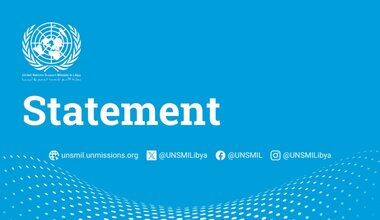UNSMIL survey: Libyans invited to help shape the Structured Dialogue
TRIPOLI—What issues should be addressed by the Structured Dialogue that the United Nations Support Mission in Libya is facilitating?
The Mission is soliciting public input.
To launch the exercise, UNSMIL invited Libyans to join a live online chat with Deputy Special Representative of the Secretary-General Stephanie Koury on 27 October. To include those who were unable to attend, the Mission is now conducting an online survey on the same questions. The feedback from both exercises will be analysed and shared with Structured Dialogue members to inform their programme of work.
The survey opens today and will close on 19 November at 11:59 p.m. Share your views here: LINK
“Engaging voices from across Libya is essential to ensure the Structured Dialogue reflects the country’s diversity and aspirations,” said Special Representative of the Secretary-General Hanna Tetteh. “The Structured Dialogue is designed to be inclusive and grounded in real-world concerns. By listening to citizens from across the country and abroad, we can help ensure that the issues addressed truly respond to people’s daily realities and hopes for Libya’s future.”
More than 450 people participated in last week’s live chat with DSRSG Koury. Seventeen per cent were women and 37 per cent were youth, between the ages of 18 and 35. Participants hailed from all regions of Libya and included some members of the diaspora. Arabs, Tebu, Amazigh, and Tuareg were all represented.
The live chat and the survey were designed to drill into each of the four themes the Structured Dialogue will address—governance, economy, security, and human rights and reconciliation—to identify the major issues that need to be addressed.
With regards to governance, as top priorities for the Structured Dialogue, a majority of participants recommended focusing on defining the powers and timeframe of the new unified government—the establishment of which is a pillar of the UNSMIL-facilitated roadmap to elections—and setting criteria for executive selection. Participants also suggested the Structured Dialogue visit the issue of centralized versus localized governance, addressing balance in representation, and justice reform.
When asked about economic issues, participants recommended the Structured Dialogue identify ways to facilitate the adoption of a unified and transparent national budget. Participants also suggested solutions were needed to stabilize and strengthen oversight institutions and enhance transparency and accountability in the oil sector.
Under security, participants suggested Structured Dialogue members consider ways to ensure safe conditions for elections, including establishing a code of conduct for security actors during elections. Emphasis was placed on the need to establish a path toward unifying security and military institutions, disarming and reintegrating armed groups, and building civilian oversight.
On the issues of human rights and national reconciliation, participants called for justice first, and increased protections for freedom of expression, peaceful assembly and public participation in political life second.
The Structured Dialogue, which is part of the political roadmap UNSMIL presented to the Security Council in August, is expected to explore concrete solutions to ongoing challenges and issues that hinder the electoral process, examining governance, economy, security, and human rights and reconciliation issues. Its work will lay the foundation for a national vision that will shape the path to long-term stability.
“The Structured Dialogue begins with listening,” SRSG Tetteh said. “I invite all Libyans to make their voices heard through the survey and help set the agenda for discussions that will shape the country’s future.”
Give your input here: LINK
 United Nations Peacekeeping
United Nations Peacekeeping UN
UN












